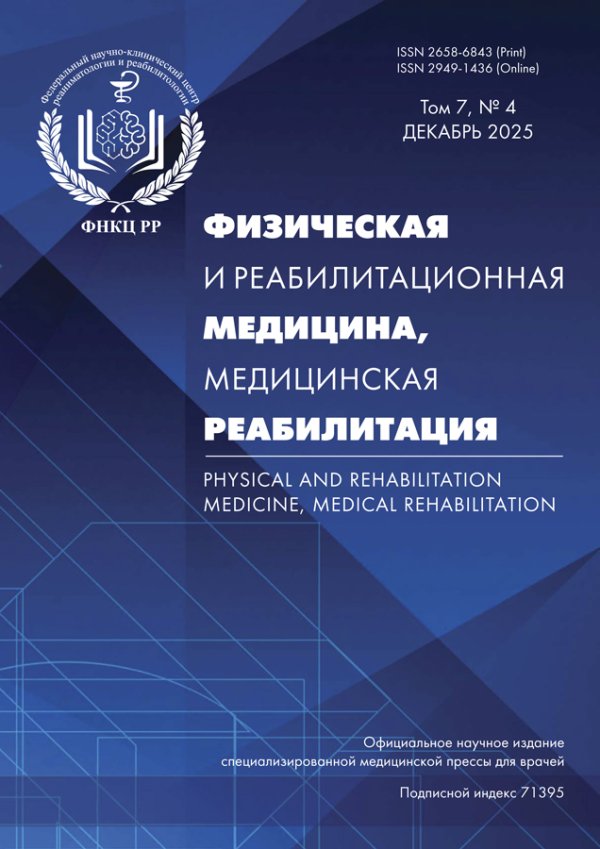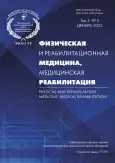Algorithm for physical rehabilitation of patients with multiple sclerosis: practical experience
- Authors: Kuzminova T.A.1, Fedorenko Y.V.1, Ivanova G.E.1,2,3, Ryabov S.A.2, Boyko O.V.1,2,4, Boyko A.N.1,2,4
-
Affiliations:
- Federal Center of Brain Research and Neurotechnologies
- The Russian National Research Medical University named after N.I. Pirogov
- Union of Rehabilitologists of Russia
- Russian Committee for Researchers in Multiple Sclerosis
- Issue: Vol 5, No 4 (2023)
- Pages: 269-278
- Section: ORIGINAL STUDY ARTICLE
- URL: https://journal-vniispk.ru/2658-6843/article/view/249995
- DOI: https://doi.org/10.36425/rehab456486
- ID: 249995
Cite item
Full Text
Abstract
BACKGROUND: Multiple sclerosis is a pressing problem of modern society and healtcare. The high risk of disability of the able-bodied population, together with the observed trend of increase in morbidity and decrease in the age of onset of the disease, create a number of economic and social difficulties. It is well known that current medical treatment of multiple sclerosis is most effective in reducing the frequency of exacerbations and disability progression, but does not affect the already established residual manifestations, indicators of disability progression objectified by magnetic resonance imaging data.
AIM: Evaluation of the effectiveness of using the algorithm for choosing a method of physical rehabilitation, according to the selected models of patients with multiple sclerosis.
MATERIALS AND METHODS: The medical histories of patients aged from 31 to 58.8 (average age 48.9±8.6) years who were in hospital treatment were analyzed (n=504; men — 34%, women — 66%), of which 56% had no disability, 11% had disability group I, 25% had disability group II, and 8% had disability group III.
RESULTS: An algorithm for working with patients in this category was developed from the perspective of functioning in the categories of the International Classification of Functioning, Disability and Health, and Assessment of Impairments, which is a huge part of the medical rehabilitation protocol for patients with multiple sclerosis.
CONCLUSION: The proposed models of patients, including pronounced disorders, make it possible to systematize and standardize the process of rehabilitation measures, improve the quality of provided medical services and provide the population with qualified rehabilitation care.
Full Text
##article.viewOnOriginalSite##About the authors
Tatyana A. Kuzminova
Federal Center of Brain Research and Neurotechnologies
Author for correspondence.
Email: kta0997@yandex.ru
ORCID iD: 0000-0002-6408-1853
SPIN-code: 8200-5455
Cand. Sci. (Ped.)
Russian Federation, 1/10 Ostrovityanova street, 117513 MoscowYana V. Fedorenko
Federal Center of Brain Research and Neurotechnologies
Email: fedorenko.yv@gmail.com
ORCID iD: 0000-0002-5836-964X
Russian Federation, 1/10 Ostrovityanova street, 117513 Moscow
Galina E. Ivanova
Federal Center of Brain Research and Neurotechnologies; The Russian National Research Medical University named after N.I. Pirogov; Union of Rehabilitologists of Russia
Email: reabilivanova@mail.ru
ORCID iD: 0000-0003-3180-5525
SPIN-code: 4049-4581
MD, Dr. Sci. (Med.), Professor
Russian Federation, 1/10 Ostrovityanova street, 117513 Moscow; Moscow; MoscowSergey A. Ryabov
The Russian National Research Medical University named after N.I. Pirogov
Email: sergey.3r@yandex.ru
ORCID iD: 0000-0001-6345-0517
Russian Federation, Moscow
Olga V. Boyko
Federal Center of Brain Research and Neurotechnologies; The Russian National Research Medical University named after N.I. Pirogov; Russian Committee for Researchers in Multiple Sclerosis
Email: olgav.ryabukhina@gmail.com
ORCID iD: 0000-0001-7153-5617
SPIN-code: 7244-5490
MD, Dr. Sci. (Med.)
Russian Federation, 1/10 Ostrovityanova street, 117513 Moscow; Moscow; MoscowAlexey N. Boyko
Federal Center of Brain Research and Neurotechnologies; The Russian National Research Medical University named after N.I. Pirogov; Russian Committee for Researchers in Multiple Sclerosis
Email: boykoan13@gmail.com
ORCID iD: 0000-0002-2975-4151
SPIN-code: 9921-9109
MD, Dr. Sci. (Med.)
Russian Federation, 1/10 Ostrovityanova street, 117513 Moscow; Moscow; MoscowReferences
- Boyko A, Smirnova N, Petrov S, Gusev E. Epidemiology of multiple sclerosis in Russia, a historical review. Mult Scler Demyelinating Disord. 2016;(1):13. doi: 10.1186/s40893-016-0016-9
- Boyko AN, Guseva ME, Sivertseva SA. Non-drug treatment methods and lifestyle for multiple sclerosis. Moscow: GEOTAR-Media; 2015. 239 p. (In Russ).
- Gusev EI, Boyko AN, Zavalishin IA, et al. Epidemiological studies of multiple sclerosis. Methodological recommendations of the Russian Ministry of Health. Moscow; 2003. 80 p. (In Russ).
- Elagina IA, Schmidt TE. Fatigue in multiple sclerosis. Neurological Journal. 2008;13(1):37–46. (In Russ).
- International Classification of Functioning, Disability and Health (ICF). Available from: https://www.who.int/standards/classifications/international-classification-of-functioning-disability-and-health. (In Russ).
- Order of the Ministry of Health of the Russian Federation dated July 31, 2020 No. 788n “On approval of the Procedure for organizing medical rehabilitation of adults.” Available from: https://www.garant.ru/products/ipo/prime/doc/74581688/. (In Russ).
- Tur C, Dubessy AL, Otero-Romero S, et al. The risk of infections for multiple sclerosis and neuromyelitis optica spectrum disorder disease-modifying treatments: Eighth European Committee for Treatment and Research in Multiple Sclerosis Focused Workshop Review. April 2021. Mult Scler. 2022;28(9):1424–1456. doi: 10.1177/13524585211069068
- Boyko AN, Gusev EI. Modern algorithms for the diagnosis and treatment of multiple sclerosis, based on an individual assessment of the patient’s condition. Zhurnal nevrologii i psikhiatrii im. S.S. Korsakova. 2017;117(2):92–106. doi: 8.17116/jnevro20171172292-106
- Gusev EI, Boyko AN. Multiple sclerosis. Scientific and practical guide in 2 volumes. Vol. 1. Moscow: Human Health; 2020. P. 608. (In Russ).
- Clinical guidelines [Multiple sclerosis], 2022, Approved by the Scientific and Practical Council of the Ministry of Health of the Russian Federation. Available from: https://e-ecolog.ru/docs/3IEruNadLn_FbNbeMKLxF/full?utm_referrer=https%3A%2F%2Fwww.yandex.ru%2F. (In Russ).
- Clinical recommendations «Multiple sclerosis (G35.0)». All-Russian Society of Neurologists, etc., 2020. Available from: https://doc-way.ru/sites/default/files/2022-09/cr_23_0.pdf. (In Russ).
- Gusev EI, Boyko AN, Stolyarov ID. Multiple sclerosis (reference book of terms). Moscow: Human Health; 2015. 437 p. (In Russ).
Supplementary files










